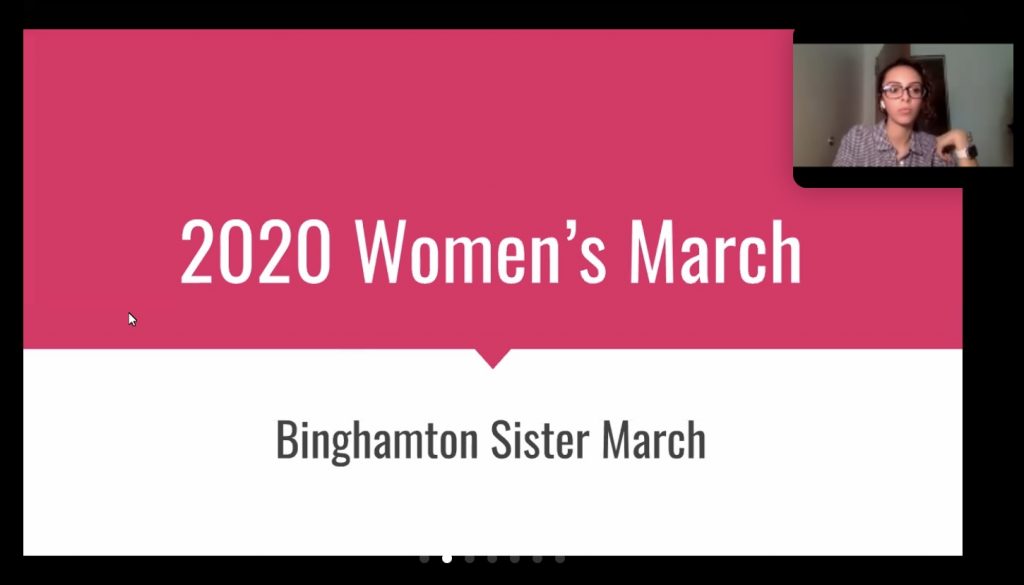As demonstrators across the country participated in the second Women’s March of 2020, a group of Binghamton University students organized a virtual version of the march.
”Sister March for Binghamton Students” was held on Saturday, Oct. 17, entirely over Zoom. Attendees heard from a variety of speakers, including BU faculty, students and speakers from outside organizations, such as Planned Parenthood and the Oswego Services to Aid Families, a domestic violence and rape crisis center.
Jennifer Cunneen, an undeclared freshman and one of the event organizers, discussed how she came up with the idea with her friends when discussing politics. It took 10 days for the team to organize the event.
”We are all very politically active and passionate about this stuff,” Cunneen said. “We wanted to attend a Women’s March, but, because of [COVID-19] conditions, it would be unsafe for us to travel, so we decided, ‘Why not host it ourselves?’”
The event began with an introduction by the organizers. Dara Silberstein, a BU associate research professor of women, gender and sexuality studies, discussed the landmark Supreme Court decision of Roe v. Wade, which protects a woman’s right to choose to have an abortion without excessive government restriction. Silberstein discussed why she felt the case was important.
”Roe v. Wade was decided in 1973 and has withstood a number of challenges,” Silberstein wrote in an email. ”As [Amy Coney Barrett] is about to be confirmed [to the Supreme Court], it is clear that activists who have been trying to undo the [Roe v. Wade] precedent will have the majority they need. I worry that the Court’s decision will make it impossible for many women to gain access to the right to make this choice.”
BU student Phariha Rahman, a senior majoring in history, gave a presentation during the event about voter registration and spoke on its relevance in political activism.
”Voting is the most basic agent of change and way of being involved in one’s community,” Rahman wrote in an email. “I think when you vote for a candidate you are voting for a version of the future. In recent years, we have seen a rise in voter suppression, which makes voter education events even more important.”
Sydney Licata, an undeclared freshman, attended the event and found the presentations informative.
”I enjoyed all the presentations, but the one that stood out the most to me was on Roe v. Wade, because it made me realize just what might be at stake in terms of future Supreme Court decisions,” Licata said. ”I learned that this case does not just affect access to abortion, but also, on a larger scale, our right to privacy. I also thought that the presentations about voting were really important because voting is a way for us to actually create the change that we want to see.”
Emily DePietro, an undeclared freshman, also expressed her satisfaction with the virtual event.
”I chose to attend today first because I support the cause but also because I support my fellow women,” DePietro said. ”I am so impressed with my classmates who took on this initiative. They put in time and effort to educate [BU] students and staff about issues that affect us all. I can’t wait to see what they put together next year and am crossing my fingers for a march.”
One of the event’s organizers, Sophia Panos, an undeclared freshman, was pleased with the outcome of the event.
”The march was more successful than we ever could’ve imagined,” Panos said. ”All the guest speakers did a wonderful job and were so engaging and informative. We also had some great questions from the audience, and I am overall honored that so many people attended and offered to speak at our march.”



